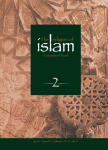The Religion Of Islam vol.2

PART V- MUSLIM
JURISPRUDENCE AND THEOLOGY
Chapter XIX - Koran And Jurisprudence
Islamic theology begins with the Prophet's acceptance to settle down at Medina, which synchronized with in increase in the numbers of Muslims there and elsewhere The Prophet was the spiritual as well as the temoral head of the community. His orders, revealed from God, were obeyed. Within the short space of ten years from that time, almost all the passages, with which future theology has been concerned, had been revealed. As the early Muslim led simple lives and their needs were few, the Islamic Laws were extremely simple. In certain cases the prohibition was introduced gradually. Beginning with a recommendation, it ended an injunction, as in the case of the use of intoxicans and gambling. The following passages indicate the manner in which the recommendation eventually merges into prohibition.
First Stage. - Recommendation “They ask you (the prophet) concerning wine and games of chance. Say! in both are great evil and certain advantages to men, but their evil is greater than their advantages" (II-219).
Second Stage. - A first step towards prohibition: “O you believers! do not pray when you are intoxicated, so that you may know well what you say" (IV-43).
Third Stage. - Total prohibition : "O Believers, intoxicants and games of chance and (sacrificing to) idols and divining arrows are abomination and the work of the devil; therefore, Shun them (V-90).
As the Koranic passages relating to rituals, ceremonies and laws were brief, they needed further explanation, which was given by the Prophet. In this manner, the Prophet himself was the first commentator of the Koran. His explanations may be divided into two parts:-
- Reflection on passages occurring in the Koran.
- Answer to questions, or relation to some particular occasion.
The rise of the Muslim Arabs after the death of the Prophet was rapid. Within a period less than sixty years, they became masters of North Africa, including Spain. Syria and the whole of Iran; in fact, all central Asia as far as China in the East. A large number of non-Arabs also embraced Islam. They were quite ignorant of the Arabic language and hence were unable to understand the Koran, and even when they learnt it, many words, sentences and passages in it were not clear to them. The inhabitants of Mecca and Medina, particularly those who had served under the Prophet and had occasion to learn the Islamic doctrine directly from the prophet, came to be held as authorities on the subject of the religion. The regular development of theology might thus be said to begin with the subjugation of the countries mentioned above. As in the case of Sufism, the development of theology was gradual. The period of that development may be divided as indicated below: -
- The life of the Prophet after the prophetic announcement, which lasted from A.D. 608 to A.D. 632,, i.e. about 25 years.
- The reign of the first four Khalifias, from A.D. 632 to A.D. 661, i.e. about 30 years.
- Umayyed Khalifas, from A.D. 661 to A.D. 750.
- Abbaside Khalifas, from A.D. 750 to A.D. 1258.
- Non-Arab period, from A.D. 1258 to the present time.
The first period is conterminous with the revelation of the Koran itself and the instructions given by the Prophet in person. The second period is rendered noteworthy by the following: -
- The earliest collection of the traditions or sayings of the Prophet.
- The building-up of the system of Muslim Jurisprudence under the guidance of the first four Khalifas.
- The arrangement of the Koran into chapters as we have it now. Of these achievements, the last is perhaps most important.
